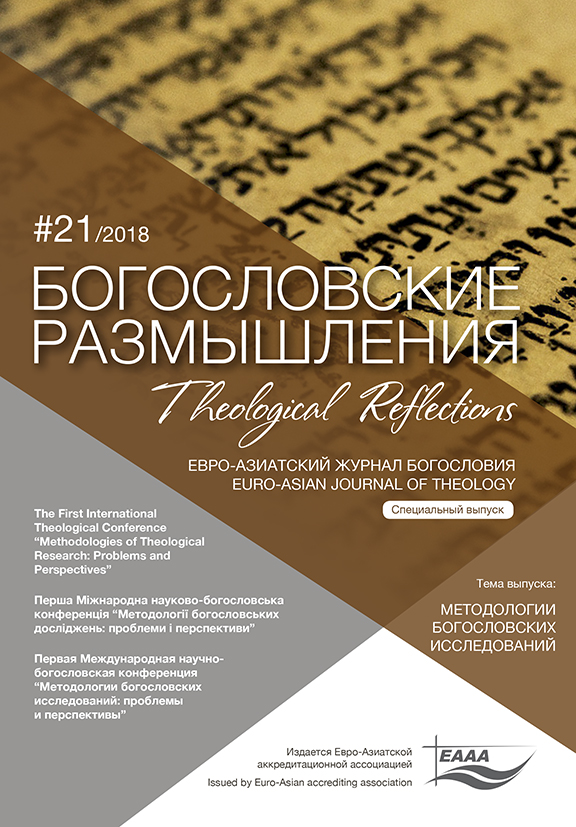Formation of Theologians through (Academic) Writing
DOI:
https://doi.org/10.29357/2521-179X.2018.21.15Keywords:
writing (academic), formation, spiritual and intellectual, writing as theological method, academic community, mentoring, editing, discussion seminars.Abstract
Theologizing in the Church is usually considered to be an oral activity. A beginning theologian who embarks on research in theology, therefore, often lacks the skills of communicating results of theologizing in written form. However, writing - academic, but not only - effectively fosters the development of one's own “voice”, the moving from an intuitive to intellectually reflected faith, from insecurity in an unfamiliar environment to gaining and expressing one’s authority in the academic community. The development of writing skills promotes a deeper understanding of theological ideas, forms the spiritual and intellectual “persona” of the theologian, and enables the integration into an academic community. Some methodologies for academic writing in theology are discussed: a disciplined and self-critical approach to self-editing, discussion seminars, mentoring by an experienced author. A theological researcher must learn to “live” in two different communities - the Church and the Academy - and write in different “languages”.
References
- Bacon, Francis. “O zanyatiyakh naukami”, in Velikoye vosstanovlenie nauk. Novyi Organon. Accessed at: http://www.lib.ru/FILOSOF/BEKON/nauka2.txt_with-big-pictures.html.
- Bakhtin, Mikhail, The dialogic imagination. Austin: University of Texas Press, 1981.
- Branovski, Y. “Rabota v informatsionnoy srede,” Vyssheye obrazovaniye v Rossii 1 (2002): 81-87.
- Burke, Kenneth. The Philosophy of Literary Form. Berkeley: University of California Press, 1941.
- Carr, Nicholas. The Shallows: What the Internet is Doing to our Brains. New York: W.W. Norton, 2011.
- Crawford, Troy, Martha Lengeling, Irasema Mora Pablo, Rocío Heredia Ocampo. «Hybrid Identity in Academic Writing: “Are There Two of Me?”» Profile: Issues in Teachers' Professional Development 16, No. 2 (October 2014): 87-100.
- Ellul, Jacques. The Humiliation of the Word. Grand Rapids, Mich: W.B. Eerdmans, 1988.
- Filipovich, I.I. “Pis’mo i chteniye kak neot’yemlemye sostavlyayushiye uchebnogo protsessa: vzaimosvyazi i vliyaniye na formirovaniye gramotnosti,” Nauchnyi vestnik YuIM 1 (2015): 102-106.
- Ivanic, Roz. Writing and Identity: The Discoursal construction of Identity in Academic Writing. Amsterdam: John Benjamins Publishing Company, 1998.
- Korotkina, I.B. “Akademicheskoy pis’mo: na puti k kontseptsional’nomu edinstvu,” Vyssheye obrazovaniye v Rossii 3 (2013): 136-142.
- Miller, J., “Second language acquisition and social identity,” Queensland Journal of Educational Research 13 no.2 (1997): 84.
- Robotova, A.S. “Nado li uchit’ academicheskoy rabote i akademicheskomu pis’mu?” Vyssheye obrazovaniye v Rossii 10 (2011): 47-54.
- Senashenko, V.S. “Nekotorye soobrazheniya ob ‘akademicheskom pis’me’ i issledovatel’skikh kompetentsiyakh,” Vyssheye obrazovaniye v Rossii 8-9 (2011): 136-139.
- Schemm, Peter R. Jr. “The Writing Pastor: An Essay on Spiritual Formation,” Themelios 37.3 (2012): 480–87.
- Scollon, Ron. “Plagiarism and Ideology: Identity in Intercultural Discourse,” Language in Society 24, no. 1 (1995): 1-28.
- Yaghjian, Lucretia B. Writing theology well: a rhetoric for theological and biblical writers, 2nd ed. London: T&T Clark, 2015.
- Библиография
- Брановский, Ю. «Работа в информационной среде,» Высшее образование в России 1 (2002): 81-87.
- Бэкон, Фрэнсис. «О занятиях науками», в Великое восстановление наук. Новый Органон. Режим доступа: http://www.lib.ru/FILOSOF/BEKON/nauka2.txt_with-big-pictures.html.
- Короткина, И.Б. «Академическое письмо: на пути к концептуальному единству,» Высшее образование в России 3 (2013): 136-142.
- Роботова, А.С. «Надо ли учить академической работе и академическому письму?» Высшее образование в России 10 (2011): 47-54.
- Сенашенко, В.С. «Некоторые соображения об «академическом письме» и исследовательских компетенциях,» Высшее образование в России 8-9 (2011): 136-139.
- Филипович, И.И. «Письмо и чтение как неотъемлемые составляющие учебного процесса: взаимосвязи и влияние на формирование грамотности,» Научный вестник ЮИМ 1 (2015): 102-106.
- Bakhtin, Mikhail, The dialogic imagination. Austin: University of Texas Press, 1981.
- Burke, Kenneth. The Philosophy of Literary Form. Berkeley: University of California Press, 1941.
- Carr, Nicholas. The Shallows: What the Internet is Doing to our Brains. New York: W.W. Norton, 2011.
- Crawford, Troy, Martha Lengeling, Irasema Mora Pablo, Rocío Heredia Ocampo. «Hybrid Identity in Academic Writing: “Are There Two of Me?”» Profile: Issues in Teachers' Professional Development 16, No. 2 (October 2014): 87-100.
- Ellul, Jacques. The Humiliation of the Word. Grand Rapids, Mich: W.B. Eerdmans, 1988.
- Ivanic, Roz. Writing and Identity: The Discoursal construction of Identity in Academic Writing. Amsterdam: John Benjamins Publishing Company, 1998.
- Miller, J., «Second language acquisition and social identity,» Queensland Journal of Educational Research 13 no.2 (1997): 84.
- Schemm, Peter R. Jr. «The Writing Pastor: An Essay on Spiritual Formation,» Themelios 37.3 (2012): 480–87.
- Scollon, Ron. «Plagiarism and Ideology: Identity in Intercultural Discourse,» Language in Society 24, no. 1 (1995): 1-28.
- Yaghjian, Lucretia B. Writing theology well: a rhetoric for theological and biblical writers, 2nd ed. London: T&T Clark, 2015.
Downloads
How to Cite
Issue
Section
License
Copyright (c) 2020 Katharina PENNER

This work is licensed under a Creative Commons Attribution-NonCommercial 4.0 International License.
All articles published in the Journal are distributed under a Creative Commons Attribution-NonCommercial 4.0 International License
By submitting an article for publication in Theological Reflections: Eastern European Journal of Theology the author grants the editors the right to publish the article and distribute it in electronic and print form.
The author reserves all copyrights and the right to use the materials of the article in whole or in part for educational purposes, to write his own dissertations, to prepare abstracts, conference reports, oral presentations, etc., as well as post electronic copies of articles (including the final electronic version downloaded from the journal’s official website) on non-commercial web-resources without the consent of the editorial board and founders.



